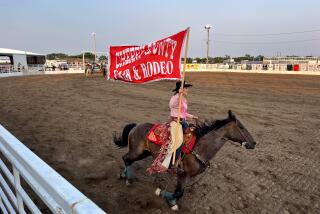New Hampshire Boom : One-on-One of 1st Primary May Be Lost
- Share via
HOLLIS, N.H. — In a land of apple orchards and covered bridges, on a wooded bank of the Pennachuck Pond, high-tech impresario Ronald Moskowitz has built a strikingly modern house that invokes New Age California more than tradition-bound New England.
Moskowitz talks about rooms without walls and feeling outside when you are indoors. It is only when he speaks of his $35-million semiconductor company and his photovoltaic roof panels, which generate enough spare electrical power to sell to the local public utility, that Moskowitz sounds like the resourceful Yankee Republican that he professes to be.
“I’m part of the high-tech revolution up here,” explains the 48-year-old transplanted New Yorker.
Moskowitz is part of the new New Hampshire, a state that is undergoing visible and dramatic change. A boom economy and a flood of newcomers--the population, now more than 1 million, has jumped 40% since 1970--has created new jobs and life styles, crowding streets and schools. And it is complicating the 1988 New Hampshire presidential primary in new ways as well.
With the state’s first-in-the-nation primary five months away, campaign officials and political analysts say New Hampshire’s unique style of one-on-one presidential campaigning--talking and listening to voters in living rooms and at backyard barbecues--may soon go the way of town criers.
The growth “has changed the way they campaign,” says Richard Winters, professor of government at Dartmouth College in Hanover. “It heightens the radio media, the print and the TV. It makes it very difficult to do the retail politics that’s associated with the New Hampshire primary. Very difficult.”
“The face-to-face campaigning is going to become very largely a thing of the past,” says William G. Mayer, one of the authors of a new book on the New Hampshire primary, “Media and Momentum.”
Mayer argues that a record number of televised debates and the increasingly important Iowa precinct caucuses, just eight days before the Feb. 16 New Hampshire primary, will affect New Hampshire voters more than kaffeeklatsches with the candidates. Campaign officials acknowledge that Iowa has eclipsed New Hampshire to a greater degree than ever, and candidates are spending two to five days and dollars in Iowa for every one here.
‘A Domino’
“How do you win New Hampshire? You win Iowa first. We’re a domino,” says Tom Rath, a former state attorney general now working for Republican candidate Sen. Bob Dole of Kansas.
Moreover, the growth has changed the state’s body politic. Most of the newcomers are sandwiched in the so-called Golden Triangle--between Portsmouth on the coast, Concord in the center, and most particularly, the Salem-Nashua area on the Massachusetts border.
It is there, less than an hour from Boston, where abandoned textile mills have been reborn as shopping malls and high-tech firms, where luxury condominiums have sprung up on farmers’ fields and where “help wanted” signs now appear as common as the region’s brilliant red maples.
More than 500 companies have moved to the state, lured by the picturesque scenery, low taxes and warm business climate. Unemployment rates are a national wonder, holding steady at less than 3%. Despite growing congestion, Money magazine last month declared Nashua the most livable city in the United States.
‘Living High’
“It’s boom time right here,” said Hillsborough contractor Steve Bethel, 35, another transplanted New Yorker. “We’re living high off the hog.”
In some ways, the influx of outsiders probably makes New Hampshire, long derided as atypical of the nation’s electorate and undeserving of the first primary, more like other states.
“The people living here come from all sorts of places in the country,” says John Michaels, a lawyer in condominium-crammed Londonderry. “This could be a suburb of Raleigh (N.C.) or Chicago.”
Or, more to the point, Boston. State officials estimate 40% of the new arrivals came from neighboring Massachusetts. They are a special factor this year.
“The problem is, a lot of them think they still live in Massachusetts,” says former Democratic gubernatorial candidate Paul McEachern. “They work in Massachusetts. They read Boston papers. And they watch Boston TV.”
Massachusetts governor and Democratic contender Michael S. Dukakis hopes that they also will give him strong support in a critical state. In the absence of hard data, however, his campaign plans to poll new residents to determine what they think, read and watch.
“I just don’t have a sense yet as to who they are,” explains Dukakis’ state campaign director, Charlie Baker.
How they live may be as important. Since many are working couples, they are rarely home to attend rallies or meet door-to-door canvassers. Former Gov. Hugh Gregg, now active in Vice President George Bush’s campaign, complains that few newcomers join local civic clubs or attend campaign functions. “The newcomers don’t take part in community affairs,” he says. “A lot are very affluent people who are world travelers. They live here because it’s convenient.”
Predominantly white, young and professional, the newcomers are called “new-collar voters” by one analyst.
“You’ve got bedroom communities now and they’re very hard to organize,” says Mark Longabaugh, state director for Democratic contender Rep. Richard A. Gephardt of Missouri. “There’s no community. They’re really a suburb of Boston. There’s no cohesion as a town. Their world is elsewhere.”
Opinions vary as to how the influx will affect the 1988 vote. Statewide, the number of registered independents has grown by a third since 1980. In all, 37% of voters are registered as Republicans, 33% are independents and 30% are Democrats. The primary is open, with about 100,000 votes usually cast for Democrats and about 150,000 for Republicans.
But no one is rushing out to sign up new voters. In 1984, Democrats assumed that newcomers must be more moderate than local Republicans. The state party spent $30,000 registering new voters. Then came November.
“To our everlasting embarrassment and dismay, they (the new voters) voted Republican in the general election,” laments George Bruno, former state Democratic Party chairman. “I doubt we’ll do that again.”
But this time, the Republicans may be surprised. The GOP has not had a contested primary in the state since 1980, when Reagan was first elected, and no one knows how the independents will swing.
“I think the most obvious change will be for the Republicans,” said Ralph Whitehead, professor of public service at the University of Massachusetts at Amherst. “That’s the biggest question mark.”
Granite Staters, old and new, take fierce pride in their primary. State law, after all, mandates the primary date a week before any other. It brings worldwide attention and more than $8 million to the state. Moreover, the state has an uncanny knack for picking future presidents. Since the primary election began in 1952, no one has been elected President who did not win here first.
Given that history, political veterans view the changes with mixed emotions. One theory holds that New Hampshire voters, by grilling candidates over the kitchen table, serve to screen candidates in ways that the rest of the country never can. The exposure has given dark horses like Jimmy Carter the chance to compete against better-financed rivals.
Burden to Front-Runners
But critics say the charms Carter used to woo voters in small groups did not necessarily serve him in the White House. And the face-to-face politics and time-consuming campaigns sometimes work against front-runners, burdened with large entourages and high expectations. New Hampshire voters are notably contrary to such folks, as Walter F. Mondale discovered in 1984.
For all the changes that have occurred in the state, the give and take of living rooms and kitchens remains a Norman Rockwell staple of New Hampshire’s 1988 political landscape.
In rural Cheshire County, Republican candidate and television evangelist Pat Robertson began one recent day with a group of businessmen worried about the takeover of local industries by foreign investors, and ended with a group of parents angry about “secular humanism” in their public schools.
In affluent Concord, the capital, Republican and former Delaware Gov. Pierre S. (Pete) du Pont IV faced back-to-back questions by an ardent foe of gun control and by a critic of U.S. policies in Nicaragua. (Du Pont said he was opposed to gun control and in favor of aiding the contras.)
Over in blue-collar Manchester, former Arizona Gov. Bruce Babbitt, a Democrat, stood between plates of chocolate cake and a table of family photos. After his 20-minute speech, the first three questioners challenged his views on foreign policy, the economy and abortion.
Not everyone is so tough on the candidates, however.
In Nashua, Gephardt spoke one recent evening for more than an hour in a home on a street that did not exist 14 months ago. Many of those attending were new to New Hampshire and new to hobnobbing with a possible President. At least one found the experience exhilarating.
“I just moved here from Kokomo, Ind.,” said homemaker Eloise Wheeler, flushed with excitement. “This is my first candidate. And I said I’d vote for the first candidate I met.”
More to Read
Get the L.A. Times Politics newsletter
Deeply reported insights into legislation, politics and policy from Sacramento, Washington and beyond. In your inbox twice per week.
You may occasionally receive promotional content from the Los Angeles Times.











